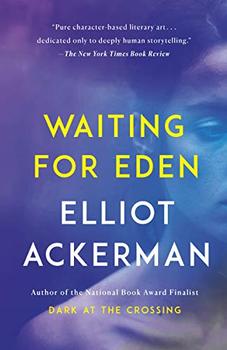Summary | Excerpt | Reading Guide | Reviews | Beyond the Book | Readalikes | Genres & Themes | Author Bio

For three hours, the nurses hardly spoke.
Then the C-17's engine ground against the air, slowing. Both nurses yawned, their ears popping in the descent. Eden groaned, feeling the pain in his ears, despite every other thing he could've felt. The kid lay across from them, facing the bulkhead, soundless and peacefully unaware of the quiet struggle occurring next to him.
The C-17 banked as they flew their final approach. The two nurses watched as Eden's temperature crept safely downward, the fresh blood saving him. His fever dropped, his progress mirroring the flight's descent. When the C-17 touched down, its tires smoking the runway, the young nurse recorded his final temperature: a low grade fever, exactly as it'd been on take off sixteen hours before.
They taxied down the runway, the flightless wings of the C-17 sagging heavily toward the ground. The young nurse and old nurse stood on either side of my friend's gurney, poised like a couple of bobsledders, ready to get him off the C-17 and on his way to the burn center. An unspoken satisfaction passed between the two nurses. This flight had been historic in a way. My friend was, they'd been told, the most wounded man from both the wars. As advanced as medicine had become, that likely made him the most wounded man in the history of war, and they'd just kept him alive from one side of the world to the other.
Over the C-17's engine there was a distinct thumping in the air. The young nurse leaned into one of the plane's portholes. A white helicopter with a red cross idled on the tarmac. All of this for just one patient, she thought. Her mind wandered and she recalled something she'd read or heard once, in a place she couldn't quite remember, about how the suffering of the world is in the suffering of the individual and that in the individual is all the world, or something like that. Even though she couldn't remember the whole idea she liked what it said about her and her work, and as the C-17 taxied toward the helicopter, she mulled over these thoughts and what it meant that they'd saved Eden.
Red and green tail lights and runway lights pulsed in the early morning fog. The back ramp of the C-17 gaped open. The nurses ran my friend down the ramp. They handed his gurney over to a handful of paramedics who took it with all the frenzy of a pit crew. Then the older nurse ran back into the C-17. She'd forgotten to hand the paramedics his chart. She returned down the ramp and scrambled onto the tarmac, clasping the chart to her chest as its papers threatened to blow away in the down wash of the many engines. Already the white helicopter pitched and whined, beginning to take off. She ran toward it. Lucky for her, one of the paramedics looked up at that moment. He saw her coming and she managed to hand him the chart. The older nurse then walked back over to the C-17. On its ramp sat the young nurse. She untied her black hair, ran her fingers through it, and then with several twists of her wrist pulled it once again into a bun. The two sat together, looking off.
The young nurse stared down the runway, in the direction the white helicopter had left, toward the distant lights of San Antonio. "Who's meeting him at the hospital?" she asked the old nurse.
"A burn triage team."
"That's not what I meant," said the young nurse.
The old nurse looked back at her. "I don't know. I didn't want to ask."
The two stood and walked back up the ramp.
In the C-17, the kid still lay on his side, facing the bulkhead. The young nurse rested her palm on his shoulder. He didn't move. Quickly she touched his forehead with the back of her hand. It was cold. She planted her index and middle finger on his neck. Nothing. She put her cheek inches from his mouth. She felt no breath and his face was the same as sleep.
The old nurse pulled the blanket away.
Excerpted from Waiting for Eden by Elliot Ackerman. Copyright © 2018 by Elliot Ackerman. All rights reserved. No part of this excerpt may be reproduced or reprinted without permission in writing from the publisher.




Poetry is like fish: if it's fresh, it's good; if it's stale, it's bad; and if you're not certain, try it on the ...
Click Here to find out who said this, as well as discovering other famous literary quotes!
Your guide toexceptional books
BookBrowse seeks out and recommends the best in contemporary fiction and nonfiction—books that not only engage and entertain but also deepen our understanding of ourselves and the world around us.